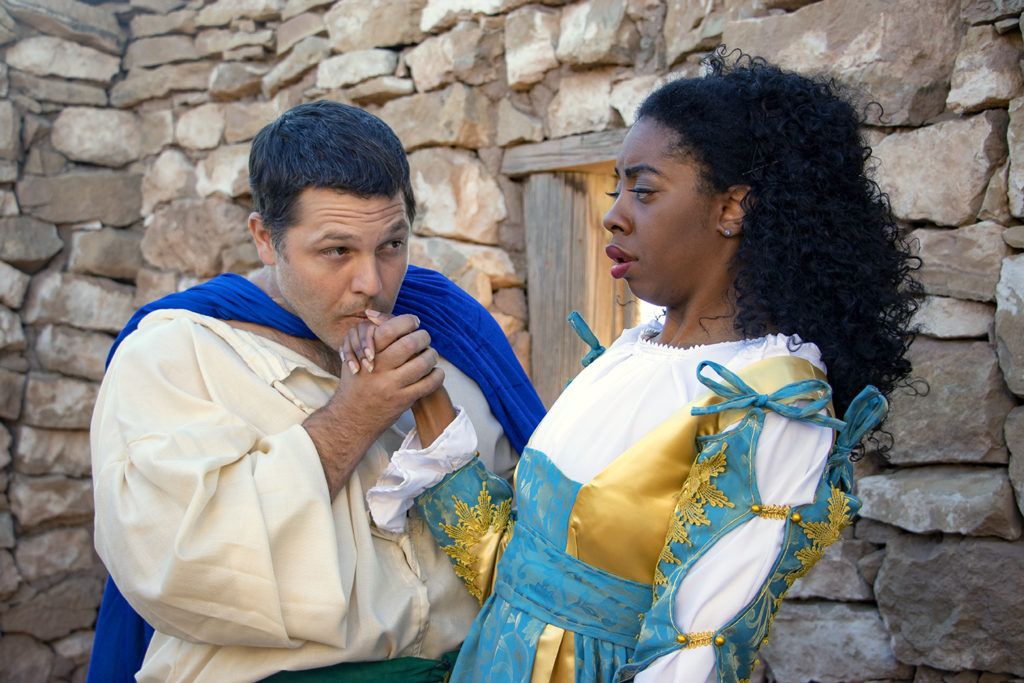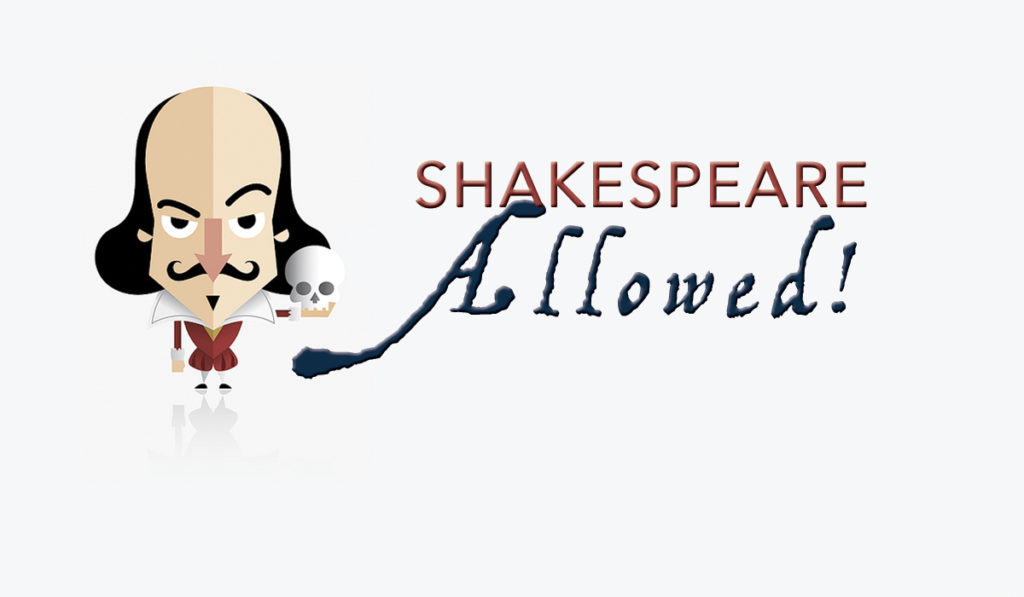I’ve always found the arts to be an incredible source of healing, learn-
ing, and connection with others. The start of a new project is an ex-
citing and daunting time when you don’t know how things will turn out, if you’ll be happy with the final product, or what challenges await
weeks down the road. This uncertainty can be balanced and offset
with confidence and experience, qualities which are immediately
tested on day one of rehearsal. And then connections begin to form. Words on paper become lines delivered by talented performers. Movement throughout the rehearsal space puts a shape to the work, and the play begins to gain its feet.
Trust grows and suddenly, the scenes sway with life. We gain new understanding of the words and the story and strengthen our connection with one another.
Without the love and support of my community, and most importantly
my partner, Joanie (Love you, sweetie!), the words would still be on
the page. My most sincere and heartfelt gratitude goes out to those
who patiently listened, unconditionally trusted, and empathetically
supported our cast and crew during the creation of this play. Please know that your support of your loved ones during the rehearsal pro-
cess is invaluable, and it’s you who keeps us in balance as we create.
This reimagining of the original translations of “God of Vengeance”was a pleasure to work with. Thank you to Flagstaff Shakespeare Festival’s dramaturgy staff for compiling and adapting the script. Special thanks to Dawn Tucker—one of the most fierce and inspirational people I know—whose suggestion it was for the sex workers to take on the surrealistic role of “Greek chorus” throughout our play, a choice that created agency and voice for character-types who traditionally have little.
Enjoy as we transport you to a provincial town outside of Warsaw,
Poland, in 1906. Here you’ll find the Chopchovich family living above
the brothel that “Uncle” Yankel owns and operates, while the family
attempts to balance their Jewish identity with past trespasses. Sin
and virtue, expectations and reality, mercy and vengeance all teeter
under one roof. What will be left when it all comes tumbling down?
Garrison Garcia
Director, God of Vengeance
As FlagShakes’ last show of the season prepares to take the stage this Friday, we wanted to hear from the powerhouse women behind the roles of traditionally-male players.
We know you’ll love hearing from them as they’ve put tons of work and intention behind making this an incredible storytelling experience for you. We sat down with Katherine Stewart, who is playing Prospero and Cadence Lamb, who is playing Ariel to learn more.
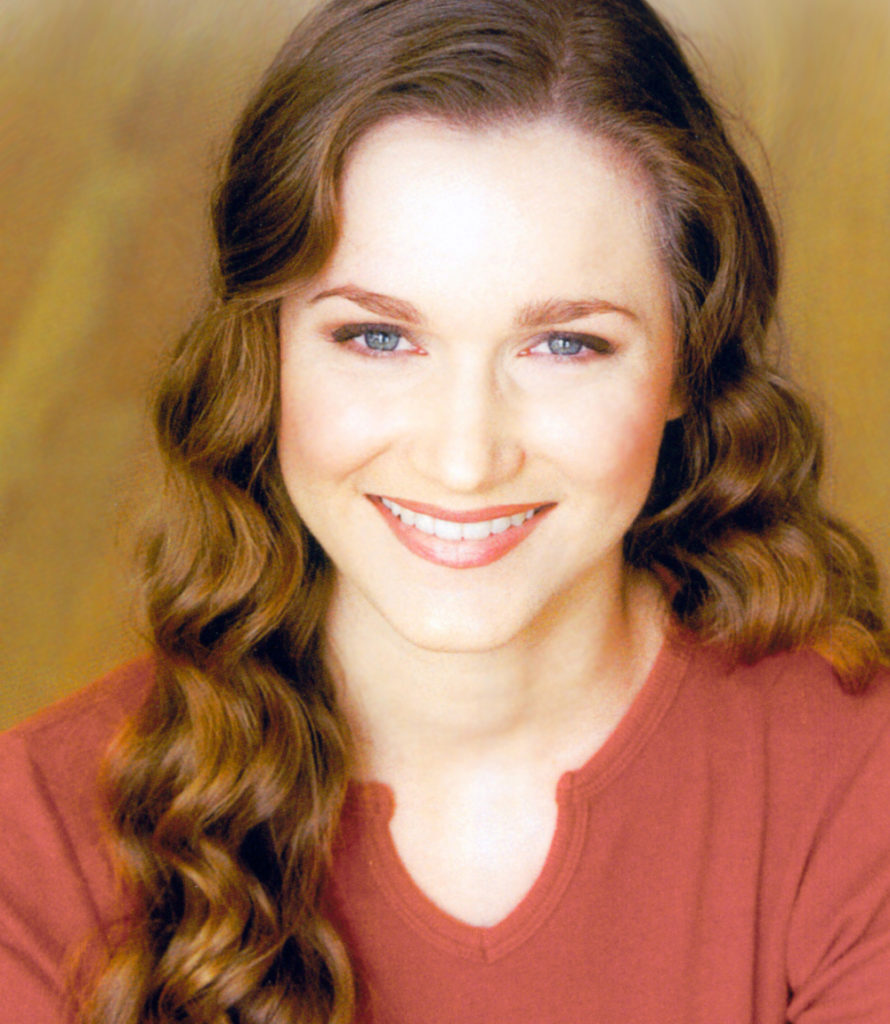
What has been your favorite role with FlagShakes?
This is my first opportunity to work with FlagShakes, so my favorite role would be this one! I hope that I’ll have the chance to add more roles in the future.
How does this role compare to others you’ve done?
Prospero is a person with a lot of difficult lived experiences. He has been betrayed by family and made an outcast. He is obsessed with knowledge, and to a very real extent, control. Control was taken from him when his kingdom was usurped, and so the way he tames the island, the spirits, and even the waves show him regaining control of his own existence. I think Prospero is a unique character because he is not acted upon – his struggles happen before the play begins. What we see is his personal Act Five.
Do you have a dream role, Shakespeare or otherwise?
I would give a heck of a lot to play Isabella in Measure For Measure. She’s so beautifully flawed.
What’s your favorite quality of this character? Least favorite?
I love Prospero’s world-weariness. I’m not wild about his temper.
Since these roles have been performed by thousands of people, do you have a new take? What are you hoping to highlight in this production?
Christine has counseled the cast to simply “tell the story.” So my goal is no overt agendas or hot takes, and the audience will take away what speaks most to them.
How important is the relationship between these two characters? How are you tackling that in rehearsals?
The relationship with Prospero and Ariel is interesting because of the dynamic alternates between master/servant and parent/child. Ariel is excitable and flighty, which is a big contrast to Prospero’s deliberate plotting and reflection. Ariel is innocent and unwise; Prospero is embittered and pragmatic. They are two ends of the same scale.
How does FlagShakes’ commitment to original staging practices help you communicate the character?
I can’t think of another company that would do a completely gender-reversed casting of such an iconic show. There just wouldn’t be the opportunity to speak these words. I actually get to say “We are such stuff as dreams are made on” and check it off my bucket list. Amazing!

What has been your favorite role with FlagShakes?
I don’t think I can count Ariel, because I’m still in that process, but he very well may be my new favorite. But for now, I will go with Friar Lawrence in Romeo and Juliet. When I first got my offer, I was sure it was a mistake. I mean, I certainly wouldn’t have figured I’d be playing a middle-aged man anytime soon if ever. But as I started to get to know the character, I realized he and I really do have a lot in common, like our priorities and how we respond to a crisis. That’s something I’ve always admired about Flagshakes. They cast based on inner qualities of the actor before assessing physical attributes, which is why I think this gender-reversed production of The Tempest works!
How does this role compare to others you’ve done?
Ariel is incredibly different from any role I’ve done, mainly because he isn’t human, he’s a spirit. I have reveled in exploring his movement outside of a typical human’s social boundaries. It’s also fun in that he is invisible to most characters for the whole play, which gives me many opportunities to earn the title “tricksy spirit” that Prospero gives me.
Do you have a dream role, Shakespeare or otherwise?
Fortunately, I have already played two of my dream roles: Constance in King John and Princess Winifred in Once Upon a Mattress. But I would certainly play either again in a heartbeat.
What’s your favorite quality of this character? Least favorite?
We have decided that our version of Ariel is solely focused on the present. He is fully encompassed in whatever is right in front of him and nothing else in the universe matters. I wish more people, including myself, had more of this quality. Certainly, not to the extent at which I’ll be playing it, but I do think it’s a reminder to experience and fully invest in your present as it happens, instead of getting caught up in your head. My least favorite attribute is that Ariel has absolutely no ambition. He only stands up for himself once in the play and just follows orders for the rest of it (even though he is clearly the most powerful thing on the island in terms of magic).
Since these roles have been performed by thousands of people, do you have a new take? What are you hoping to highlight in this production?
I have actually never seen a production of The Tempest, whether live or on film. And I don’t plan to until after we close. It’s far more freeing to create the character strictly from the text and who I am without the interpretations of others in my head. That being said, I hope to highlight his sense of focusing on the present and his immersive curiosity and wonder that it seems only children and spirits have ;).
How important is the relationship between these two characters? How are you tackling that in rehearsals?
It was important for us to view the relationship both from an objective perspective as well as from our characters’. Objectively, Prospero is taking advantage of Ariel and using his powers where he could have just immediately set him free. However, when viewed through our characters’ lenses, Ariel is happy to serve a master he views as more moral and loving than his past master. And Prospero enjoys Ariel’s presence beyond just using his powers as a tool. Of course, other productions could choose to highlight other aspects and treat it more like an enslavement, but we chose to play it more like a loving, if slightly not fair, bargain between good friends.
How does FlagShakes’ commitment to original staging practices help you communicate the character?
First of all, this is my second time working with Christine and I am so grateful for it. Her knowledge of how to interpret the text across the whole canon is priceless and hard to come by. As far as staging goes, I have certainly appreciated the freedom I have been given to be amongst the audience and roll around the stage. Flagshakes is always good about including the audience and making them feel a part of the story wherever possible.
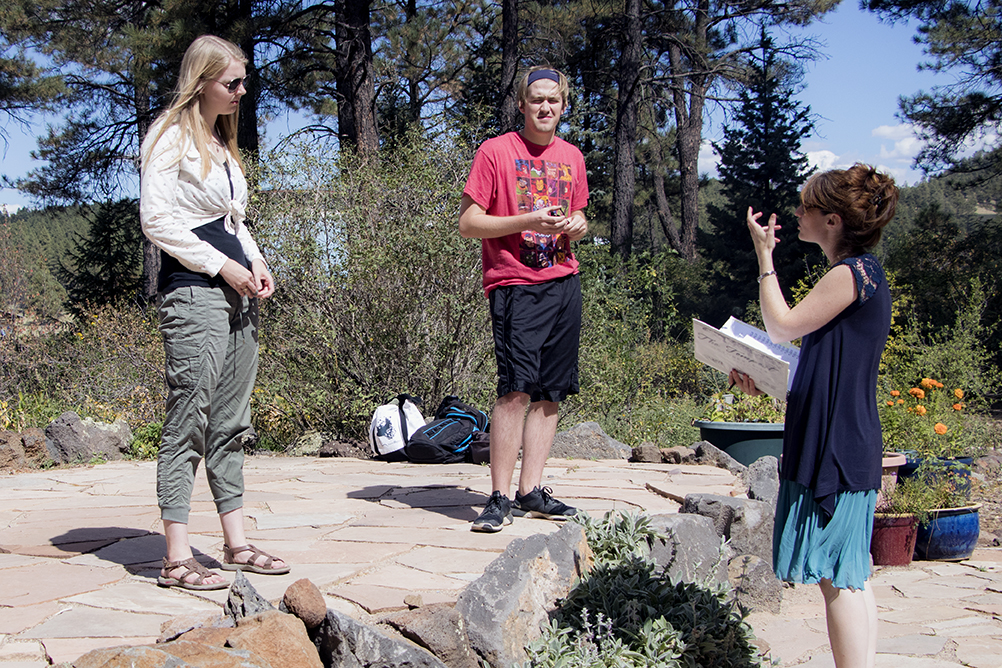
We’re now almost two weeks into the rehearsal process of The Tempest. Slowly but surely we’re making our way through the whole play, focusing on the different groups that arrive and interact on the island. We’ve established a strong bond between Prospero and the supernatural being of Ariel. The nobles, as we’ve started to call them, including the king Alonso with his brother Sebastian, his advisor Gonzalo and follower Adrian, as well as Duke Antonio. This group appears always together in the play and have a curious dynamic, as Antonio and Sebastian constantly try to undermine the pursuit of hope by Gonzalo. Then we rehearsed some heartwarming scenes between Miranda and Ferdinand. It’s astounding to hear Miranda discover the beauty of mankind in her very sincere and truthful way. Finally, the most laughs we’ve had in rehearsals so far has been with the hilarious trio of the drunken butler Stephano, the jester Trinculo and the creature of the island, half-human half-something else, called Caliban. The opposing character personalities in these scenes alone are funny. Caliban’s rage and need for revenge are countered by the drunken Stephano and Trinculo, that every observer understands that any plans forged by these are doomed to fail. But as always it’s wonderfully entertaining to observe their attempts.
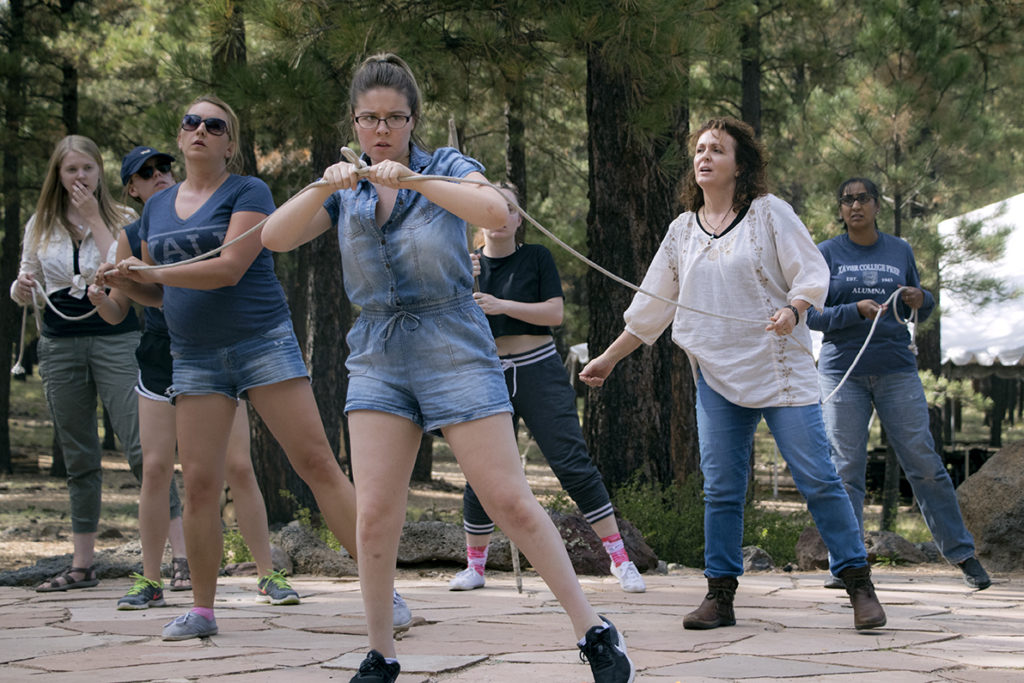
The only new approach we’ve taken with this production is the gender-reversed casting. As it turns out, it’s the first production ever to fully commit to gender-reversed casting, meaning that all roles will be played by the opposite sex. So, if you come to see this production, you’re in for a treat of a world premiere. In a way, you would have expected to trigger a lot of discussions during rehearsals about the casting. But after our first set of ground rules to portray the characters as truthfully and best as we can, our focus in rehearsals has been to tell the story of The Tempest as clearly as possible. We forget how often women are cast to play men’s roles nowadays, so the casting sounds way more outlandish than it is, at least for the women it is just another male role. Even our male actor has acted in women’s roles before.
The most important lesson to learn from the gender-swap is that the acting becomes about the character and what part they play in the story, rather than about gender. Just as in real life, we all can play the same part but we all bring our very own and distinguishable personality to it. And what a joy it is to see that in rehearsals.
The second show in our 2018 season, Titus Andronicus, remains popular, and as Titus Director/FlagShakes Executive Director Dawn Tucker put it:
OUR PRODUCTION WILL BOTH LEAN INTO THE ABSURDITY PERCEIVED BY THE MODERN AUDIENCE AND PROVIDE, THROUGH MOVEMENT AND MUSIC, VISCERAL PATHWAYS TO UNDERSTANDING IT IN A MODERN CONTEXT.
We wanted to know what the cast was doing behind the scenes to get ready for such a show, so we sat down with Vicki Thompson (Titus) and Christian Tripp (Lucius) to find out more.
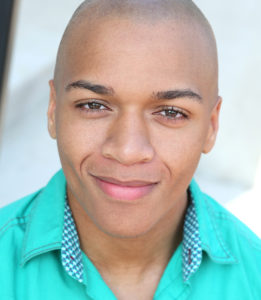 What has been your favorite role with FlagShakes?
What has been your favorite role with FlagShakes?
CT: This is my First time with FlagShakes, but I love making discoveries as Lucius in Titus Andronicus!
VT: Titus Andronicus is, by far, my favorite and most challenging role with FlagShakes.
How does this role compare to others you’ve done?
CT: This is my first full Shakespeare role, so automatically that has a few new things like the language to keep in mind. However, I have played soldiers quite a few times now, and what I always carry over is making sure I’m actively chasing an objective.
VT: Titus may be one of my favorite Shakespearean roles, period. Although Gertrude, in Hamlet, was quite delicious to play as well. But in Titus, I play a role traditionally played by a man, and that makes it more exciting because people don’t expect it and (hopefully) are curious.
Do you have a dream role, Shakespeare or otherwise?
CT: My dream role is Iago from Othello. I love the idea of portraying characters in ways they aren’t normally seen. To be able to take one of Shakespeare’s most beloved characters, do something not often done, and unlock the reasoning behind why he is the way he is would be an amazing experience.
VT: I don’t have a dream role at this time because fortunately, I have played a lot of them. I wouldn’t mind being in a Coen Brothers movie or some “over the top” children’s theatre villain.
 What’s your favorite quality of this character? Least favorite?
What’s your favorite quality of this character? Least favorite?
CT: My favorite quality of this character is how stable Lucius is. Lucius has been through so much at the start and end of this play, but he has to keep it together for his family. He is a fighter, and he can’t drop his guard or else his family and kingdom crumble. My least favorite quality lies in how he never uses his smarts to find peace; instead, he evokes more violence and revenge until the very end.
VT: Titus Andronicus is, by far, the most challenging and exhilarating role I have played in the relatively small catalog of Shakespeare roles I have had the honor to inhabit. I feel blessed to be trusted with such an iconic part. The complexity of this “revenge” play gives me, as a woman, the opportunity to explore complicated emotions as a soldier just home from war and as a mother seeking retribution for her many (many, many) sorrows.
Since these roles have been performed by thousands of people, do you have a new take? What are you hoping to highlight in this production?
CT: What I am hoping to highlight in Lucius is yes, he is a great warrior, but he is someone who thinks, too. I want my take on Lucius to be layered with three-dimensional qualities of holding back his rage for the sake of keeping a cool head for his family. With Titus on the verge of insanity, he can’t afford to lose.
VT: Without giving too much away…I am delving into the themes of family, as only a mother can, and coming up for air just long enough to assess the damages and by my own hand, in some cases, level the playing field.
How important is the relationship between Titus and Lucius? How are you tackling that in rehearsals?
CT: Everything I do is for Titus and to support her. I want to prove to her that I am a worthy son; it is my way of thanking her for taking care of me throughout war times. Because of this relationship, Titus feels she can trust me without hesitation over anyone else—my loyalty to her is unyielding.
VT: The relationship between Titus and her son Lucius is an extremely important one. They have been career soldiers together, so they’ve been trained to trust each other in a battle zone, which, unfortunately, helps them navigate back at home. Christian Tripp and I have been discussing gene pool issues and are working with the lines to find the bonds. Christian calls me “mom” and last night I called him “sweetums,” so the relationship is definitely building.
How does FlagShakes’s commitment to original staging practices help you communicate the character?
CT: The staging helps me communicate the character by allowing me to fully communicate with the other characters. My need to talk becomes so great that the words flow out without stress. The stage is filled with juicy tension, which causes interesting choices to emerge in a free environment.
VT: FlagShakes, as an organization, is expanding the horizons of this, “our little mountain town,” and finding ways to explore and increase the excellence of the arts community. With Dawn Tucker at the helm and all the dedicated board members, this venture stands on solid ground and will only get better and stronger in the years to come. Be prepared for big things from this company. I feel more than fortunate to play Titus Andronicus. Come along for the ride—you won’t be disappointed.
Right now, in the Allen Elizabethan Theatre at the Oregon Shakespeare Festival in Ashland, Oregon, a new play is in the repertory. It was written by (fun fact) the most-produced American playwright of the current theatre season (outside of Shakespeare), Lauren Gunderson. The play is called The Book of Will and concerns the assembly and printing of the so-called First Folio edition of Shakespeare’s plays, published some seven years after his death. I haven’t seen or read the play (more than what’s freely available online, that is), but it is billed as a sort of paean to the Bard and his works; a lively, if fanciful, history of events we know very little of, sad to say, but which by golly we’re glad occurred (however they occurred) because without them you wouldn’t be reading this—nor coming to various sites in beautiful northern Arizona settings to see Flagstaff Shakespeare Festival performances.

“What if all the words were lost?” poses a headline at O-Shakes’s web page about the play. What indeed. The world would be a very different place, no doubt whatsoever. Well, for one thing, there’d be no Shakespeare festivals anywhere—beautiful outdoor settings or not! And so much more than that: the whole rich, heart-opening, weep-inducing, belly-laughing, tragical, astounding, uproarious mess that is Shakespeare’s canon—gone! A void in the world? Nay, a veritable cavernous maw, I say!
Whoa, dial it down, Ben. We’re all on the same page here—those brilliant, scintillant pages that Heminges and Condell managed to wrest from the transient flux of Elizabethan (well, Jacobean) life 400 years ago. May your place in Heaven be assured, you great men of the theatre!
And truly, that’s the crux: these forward-looking men committed to paper (itself a transient form, but let that go) those great stories and poetry of the King’s Men’s man. Think about that: dramatic art on paper. The soaring words and themes and living drama of the Western world’s greatest dramatist flattened out like so many squashed ants. How could it be done? More importantly, how can those squashed ants be resuscitated into living drama once again? How can those dry, flat symbols magically expand into three dimensions? Four—bodies in motion in space and voices on the air!
As a symphony orchestra brings to life the great works of Mozart or Beethoven or Mendelssohn from the lifeless lines and dots of a symphonic score, we, a company of actors, must first interpret, then breathe our own life into, this flat suggestion of an idea of a concept! Impossible!
And yet…
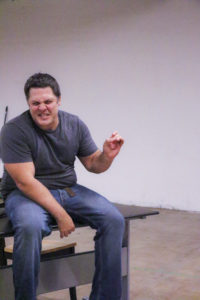 As the text and speech coach for Flagstaff Shakespeare’s production of The Taming of the Shrew, that’s the nut I’m trying to crack. And such a delicious, impossible nut! Our director, Jesse Kamps, and fearless leader Dawn Tucker have entrusted me with the task of helping my fellow actors bring to vibrant life the “mere words” of a man 400 years dead. My task is twofold. The first part is to make sure the actors understand the text. What do the words mean? What is the sense of a phrase, a line, a speech? What is happening in the scene? Does this word or phrase mean the same thing now as it did when Shakespeare wrote it? The second part is to make sure the audience understands the same text, but this time as speech. The difference between text and speech, though it may appear largely mechanical (anyone who can read could do it, right?), is fraught with challenges. And the difference between merely well-spoken text and living, breathed-and-breathing Shakespearean language that is both comprehensible and bursting with meaning—well, that’s another matter entirely.
As the text and speech coach for Flagstaff Shakespeare’s production of The Taming of the Shrew, that’s the nut I’m trying to crack. And such a delicious, impossible nut! Our director, Jesse Kamps, and fearless leader Dawn Tucker have entrusted me with the task of helping my fellow actors bring to vibrant life the “mere words” of a man 400 years dead. My task is twofold. The first part is to make sure the actors understand the text. What do the words mean? What is the sense of a phrase, a line, a speech? What is happening in the scene? Does this word or phrase mean the same thing now as it did when Shakespeare wrote it? The second part is to make sure the audience understands the same text, but this time as speech. The difference between text and speech, though it may appear largely mechanical (anyone who can read could do it, right?), is fraught with challenges. And the difference between merely well-spoken text and living, breathed-and-breathing Shakespearean language that is both comprehensible and bursting with meaning—well, that’s another matter entirely.
Consider how we humans communicate. Before the advent of all our many analog and digital communication devices, human communication (aside from writing) was a full-body experience. For those possessed of all senses, we “spoke” across the wide bandwidth of sight and sound, producing a complex of audio-visual information directed to the receiver. You don’t have to be Italian to appreciate the value of a good gesture! In the Digital Age, we’ve constricted that bandwidth enormously, into narrow streams of inflexible data that tend to denude, rather than enrich, communication. Just think of how often intentions are mistaken in a text message or an online comment thread and you’ll know exactly what I’m on about.
Shakespearean language, though essentially modern English (technically “early modern English”), is different from our contemporary English not so much because of linguistic changes in vocabulary, syntax, and grammar—though these do differ, somewhat, from ours—but because of the particular ways Shakespeare used the language at his disposal.
He pushed its boundaries and then cracked it wide open. I imagine that, were he alive today, he would be writing things as newfangled and mind-blowing now as they must have seemed to the Elizabethans then. He rose above the limitations of his own language and made it a servant to his art. That’s what makes it hard to understand more than the changes in English over the centuries. He was a poet—he used language differently from others, elevated it to a new plane.
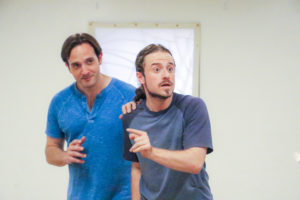
But in his plays Shakespeare wasn’t, strictly speaking, writing poetry—he was writing drama. It was meant to be seen and heard: enacted. So merely speaking the text aloud in a clear voice is insufficient to convey its complex meaning from actor to audience. The task requires another avenue, another methodology. I believe that methodology to be the subtle, unique combination of an actor’s understanding of the text expressed through a range of vocal properties (inflection, pitch, rhythm, pacing) plus the bodily aspects of acting: posture, gesture, facial expression, carriage, and more. Done well, the resultant mixture is rich with expression and can render complex and expansive ideas into a perceptible form that can be easily understood by an audience, regardless of the differences in the language itself.
And that’s where I’m investing my efforts as text and speech coach. I must examine each actor’s expressive output and evaluate its effectiveness, then help them to modulate or enhance that output when it is ineffective or its meaning is unclear.
That work requires an appreciation of the actor’s gifts and limitations, an ability to adapt to their style of learning, and a thorough knowledge of the tools available to assist them in this quest to convey meaning. Easy-peasy (he said hopefully)!
It is indeed fortunate that I find myself working with a cast with many gifts and a great enthusiasm to succeed in telling Shakespeare’s story. We’re all definitely committed to producing the clearest, most delightful, thoughtful and engaging Shrew that we possibly can. And you, our dear and commendable audience, will determine how well we have succeeded.
 Enjoy the show!
Enjoy the show!
Ben Gorman
As the 2018 FlagShakes season quickly approaches, we wanted to get behind the scenes and introduce you to some of the talented artists you’ll see on stage. We sat down with Ryan Jenkins, who is playing Katherine, and Keath Hall, who is playing Petruchio. We know you’ll love hearing more about them and the insights they bring to the roles.
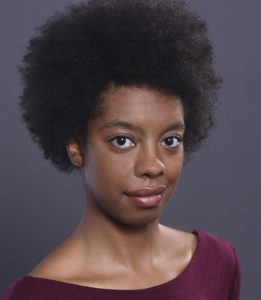 What has been your favorite role with FlagShakes?
What has been your favorite role with FlagShakes?
RJ: This is only my second role with FlagShakes. When I played Third Witch/Third Murderer last summer, it was fun to have the opportunity to experiment with playing both a human and supernatural antagonist. Coming back this season has been amazing. Working with friends again, I feel like my favorite role so far has been being an actor in the company!
KH: Last year was my debut with FlagShake,s and I was honored to play Macduff and the bloody sergeant. Petruchio this year has been both challenging and exciting; thus far, it has been my favorite.
How does this role compare to others you’ve done?
RJ: Katherine is a force to be reckoned with. Similar to the Weird Sisters, she refuses to play by anyone else’s rules. People are drawn to her but also fear her. However, the fact that she is a love interest presents unique challenges I didn’t have playing a witch. I have played a headstrong woman-in-charge before, and I have played a love interest/ingenue, but Katherine is the first role where I have to be a combination of the two. She’s more aggressive and violent than Beatrice [in Much Ado About Nothing] but shares the same sharp intellect and wit.
KH: Petruchio is odd and an extremely unreliable source of information in the play. Macduff is a pretty straightforward, straight-laced character. A character like Falstaff is at least a consistent liar, while Petruchio is unpredictable in behavior and ideals. At times, his words seem patriarchal, but at other times he seems to be wholly set against that same system. His language also shifts from something crass to that of elevated poetry. There is a lot more left open for interpretation depending on which moments the actor plays as sincere.
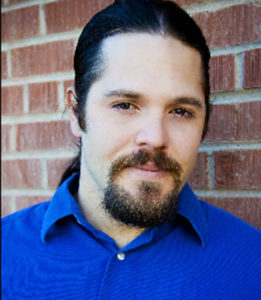 Do you have a dream role, Shakespeare or otherwise?
Do you have a dream role, Shakespeare or otherwise?
RJ: I would love to be Lady Macbeth, Portia (Merchant of Venice), and Titania (A Midsummer Night’s Dream). My dream role would be a performance capture or voice actor in a video game or movie (like “Avatar!)
KH: Still waiting for a Viking production of Hamlet. Otherwise, I have been eyeing Coriolanus for a while.
What’s your favorite quality of this character? Least favorite?
RJ: I love that Katherine fearlessly speaks her mind. “No” is a complete sentence to her (but she’s a Shakespeare character so she’s obligated to say more), and it comes without apology. She owns her intelligence. I don’t like that Katherine uses physical violence to get her way. I am not a confrontational or physically intimidating person, and I think it takes an unnecessary amount of energy to be someone who is—on stage or off.
KH: Petruchio has an energy and a grounded understanding of the world around him. This gives him some freedom to observe, comment on, and abuse some negative elements in people and society. That is fun. Unfortunately, to “end successfully” he also must impose his experience and worldview upon Kate, abusing her and several others in the process, for what he deems to be a greater good.
Since these roles have been performed by thousands of people, do you have a new take? What are you hoping to highlight in this production?
RJ: I think this role is an opportunity to explore my own ever-expanding beliefs regarding womanhood, relationships, gender roles, social conventions, love, and marriage and how to express those philosophies through Katherine. My experience with these aspects of life as a mid-twenties woman of color in a long-term relationship in 2018 has to lead to a uniquely complex perspective on Kate’s pathology and highlights how women today are still discovering and defending their own convictions on these lifestyle topics.
KH: The play is very much of a time and place, though it deals with some universal themes. Following the current issues regarding consent, the #MeToo movement and the state of feminism in the US, we have attempted to present the play in a way that asks questions to further these conversations as opposed to answering them.
My hope is to highlight the idea of marriage as a unification, a team. In this particular case, two broken people become an unstoppable force. We have set the play classically in a patriarchal world, and so to succeed the couple must play by those rules, at least superficially. Ideally, the audience will walk away contemplating the importance of love, sacrifice, and the value of a partner.
How important is the chemistry between these two characters? How are you tackling that in rehearsals?
RJ: Kate and Petruchio’s story has no dynamic without chemistry. Keath is not afraid to try anything and everything to get a reaction, which encourages me to stay as emotionally fluid as I can, and find moments where Katherine can be just as playful, witty, or impulsive!
KH: Kate and Petruchio are like fires that should build on each other. Ryan and I are good friends who are very passionate about these characters. There is a huge amount of trust we have put on each other and in our director Jesse Kamps. Negotiating the intimacy has been as honest and as safe a process as possible.
How does FlagShakes’ commitment to original staging practices help you communicate the character?
RJ: Direct address challenges me to remember I’m sharing with the audience just as much as my stage counterparts. Katherine’s biggest weapon is her tongue, so my dedication to fully expressing the language, physically and vocally, has to be as sharp and deliberate (and somehow effortless) as she is. She wants to be seen and heard at all times, so being committed to every emotion and making sure the audience sees and hears them will help them see beyond the shrew and discover her humanity.
KH: For me, there is a simplicity to it that lends itself to the actor. The focus on the performer and language helps to tell the story and limits the distraction. The connection is never clearer or more intimate with a patron than when you are looking an audience member in the eyes for the punchline to a joke or to decry tragedy.
In the summer of 1995, I found myself in my first production of The Taming of the Shrew. Fifteen years old, playing Lucentio, and in way over my head, I was exploring this language for the first time. I was struck by how seamlessly the subplot was woven into the fabric of the story, and how even the simplest stock characters had intricately drawn backstories buried ingeniously in the text. The production was straightforward, simplistic in nature and a little barbaric in its treatment of Katherine. Even at a young age, I knew we had swung heartily and missed.
There seemed to me to be much more happening than the tyrannical oppression of an intelligent, independent woman, and something far greater at stake than a man’s comfort and dominance.
Katherine, the “shrew” of the title, is a bold and misunderstood woman surrounded by a Paduan society that values only wealth, position, and the societal rules that govern it. Katherine is the intellectual and moral superior to every inhabitant of this town that we meet, and as she rejects the hypocrites and fools she is surrounded by, she is pushed to fringes of her own home. She is rejected by suitor after suitor, and just as 16th-century spinsterhood is threatening to marginalize her further, we meet Petruchio. A man in mourning, mentioning the recent death of his father three separate times, he is a fortune seeker who, strangely, doesn’t care about the trappings of wealth; someone who will play by this society’s rules, only to upend them completely. When the two meet, sparks fly, wits duel, and hormones go into overdrive.
Theirs is a seduction of the mind, not the body, and it begins at first sight.
Nearly all relationships in this play are transactional in nature, and Katherine and Petruchio are no exception. Katherine’s family strikes a bargain with Petruchio to be rid of the constant in-house challenge that is Katherine, and Petruchio inherits a handsome dowry for his trouble. Instead of trying to understand Katherine’s struggles and actually communicate with her, her family is quite eager to hire someone else to do it for them and rid the house of her. When the wedding day arrives, Petruchio attends, but systematically rejects every social expectation the Paduans have for him and his wife. He spurns their traditions, facades, and hypocrisies and, in taking Katherine to their home to start a new life together, begins his odd courtship.
The “taming” of Katherine in the play’s final two acts is often depicted as abject brutality, a misogynistic terror and a living nightmare for everyone in the house.
While it can be troublesome behavior for a contemporary audience to witness, it’s hardly malevolent. Misguided as his methods are, they are earnest attempts to bring the couple closer together while going through a shared experience. Hunger, sleeplessness, and the absence of finery and affectation are what Petruchio, this young veteran, knows. The closest relationships of his past were forged suffering on the front lines of battle and not in a velvet-draped drawing room. Petruchio’s methods, callous and ham-fisted, are always in pursuit of bringing them closer. While Katherine and Petruchio learn to speak with a common voice, and, through pain, learn to see their world in a new way, they also discover how to subvert it. By the end of the play, Katherine speaks and is heard for the first time by the very people who were so eager to buy, sell, and barter her and her sister away.
Kate and Petruchio are, in the end, the only free and independent characters in their world, and they learn that the only way to truly challenge the system in place is from within.
Petruchio is not an example to follow or a hero, but a problematic and challenging partner for Katherine. He forces us to imagine what may have become of Katherine had she been left with a family so willing to ignore and treat her as a piece of currency. Katherine and Petruchio are both called “mad” many times throughout the play by other characters in their world. Shakespeare boldly challenges his audience and questions society’s treatment of women in The Taming of the Shrew, leaving us to ask ourselves who the mad ones truly are.
–Jesse James Kamps, Director of The Taming of the Shrew
Every time I teach Othello, I begin by telling my students that I long for the day when we read the story and say, “Well, this sure is pretty poetry, but we’re past insidious racism and double standards with regards to infidelity, so this really isn’t relevant.” Until then, tragedy will continue to be the most important social tool we have for talking about our social and emotional responsibilities to one another.
Titus is much the same as Othello; it is, unfortunately, as relevant now as it was in the 1600s.
Titus Andronicus sometimes gets a bad rap because of the “unrealistic” amount of violence. There is a lot of bloodshed in the play, but sadly, it’s nothing you wouldn’t encounter in any of several war-torn countries in the world at present—especially those where the citizens have, as have the people in Titus, been embroiled in violence for multiple generations. It is universally true that violence begets violence. There’s a little Quaker church on Beaver Street here in Flagstaff whose banner proclaims, “There is no way to peace, peace is the way.” Titus exemplifies this lesson as the characters concoct violent and complex revenge plots against each other, but no one ever feels any “peace.”
Titus was Shakespeare’s most frequently produced play during his lifetime.
People often explain the play’s 16th-century popularity by undercutting the intelligence and taste of the Early Modern English society. I think that’s hardly fair. Sure, they watched dogs kill bears for entertainment and drank beer at almost every meal, but don’t we have YouTube and an opioid crisis? Elizabethans who were educated were very well educated, and those who were illiterate were still listening to some of the most evocative poetry and rhetoric available, in churches and playhouses. I think they loved Titus for the same reasons we love “House of Cards.” Titus held a mirror up to the blackest parts of the Elizabethan culture.
Our production will both lean into the absurdity perceived by the modern audience and provide, through movement and music, visceral pathways to understanding it in a modern context.
I’m really looking forward to directing this play. We’ve assembled an incredible group of artists, onstage and offstage, and I have no doubt that the show we put together will be not only spectacular and fun but meaningful and shrewd. Violence committed by one human being upon another should always be abhorrent to us, but not because of the gore or spectacle. It should not horrify so much as it should sadden. When I’m directing Titus and working with our combat choreographer, I will be focused on the human life under assault and on the loss that follows a death. This will not be a “Game of Thrones” style “slash um and forget um” play.
Then we can all look forward to contrasting this early play about revenge with Shakespeare’s later and more mature work, Tempest.
In contrast to Titus’s exclamation,“I shall never come to bliss/Till all these mischiefs be return’d again/Even in their throats that have committed them,” Prospero’s final resolution to let his (or her) enemies walk away unpunished because, “the rarer action is/In virtue than in vengeance” shows how time and experience changed Shakespeare, both as a playwright and a man.
I found Flagstaff Shakespeare Festival’s Shakespeare Allowed reading [of The Taming of the Shrew] really challenging (but still a ton of fun!).
I know it is always a mistake to bring too much of your own perspective to older art forms, but then that is one of the glories of Shakespeare to me—through the lens of 500 years of history, I always find myself thinking differently about things when I read or experience his words. But I couldn’t help feeling walls I couldn’t get past in this one.
I spent the afternoon working in the garden, and this play just kept turning in my mind. I finally sat down and re-read Katherine’s final speech. Suddenly one line jumped out at me:
“I am ashamed that women are so simple.”
But she isn’t, is she? That so flies in the face of everything we’ve seen about her that the author could never expect anyone to believe she has changed that much. Shame for being simple? I honestly don’t think so. And we have seen her change—there were a couple of instances where we see her feelings for old “man-boy” [Petruchio] evolve. But her wit remains constant.
As I re-read that line, I couldn’t imagine it without seeing her winking to him.
One more thing that really struck me here. I’ve also found myself questioning the possibility that some of Shakespeare’s plays actually need to be seen, and not just heard. I felt like the last two, reading them and savoring them like a really good single malt, was adding to my understanding and emotional feeling. But this one, I realized, left me thinking, “Wait. There is something else going on here that I actually need to SEE, on a STAGE.” There is something going on here that isn’t captured in text alone; it needs visual cues. Is this not actually a woman who has been broken, but who has, rather, found a co-conspirator? If so, this doesn’t come out in the actual lines (to me at least) but does in the feeling behind the lines.
Or might I be trying too hard to convince myself Shakespeare didn’t really mean to show her “broken”?
I guess in the end, it doesn’t matter that much, given my relationship with Shakespeare. Regardless of his motivations, he got me thinking again.
–Todd Barnell
A Love Letter to May and A Farewell to Fool for Love
This picture was taken during a “down” moment on set. In this picture, I am not playing May, yet when I look at this picture I don’t see myself: I see May. And I miss her. May is hard to say goodbye to and dangerous to hold onto.
In the blog I wrote when we started work on this show, I talked about how little of myself I saw reflected in May and how I didn’t see her as a “feminist character.” Over the run of the show, my sentiments almost completely reversed.
May’s brutal honesty and fierce desire to break away from the dysfunctional patterns she’s inherited from her addict father are qualities I admire and know too well.
In my favorite moment of the play, May believes the woman Eddie has been cheating with is on the other side of her hotel room door. This woman has already shot at May and blown the windshield out of Eddie’s car, but when Eddie tells May to hide, May’s brazen response is, “I’m not gunna hide in my own house. I’m goin’ out there. I’m goin’ out there and I’m gunna tear her head off. I’m gunna wipe her out.” She believes she’s invincible. She is invincible. It’s intoxicating to inhabit her skin in that moment. I know I’m not invincible. In fact, I suffer from pretty severe anxiety, so May gave me the gift of being totally sure of who I was and what I was capable of accomplishing; it’s something I will relish and go back to for the rest of my life.
On the other hand, I see the darkness in May. The danger is in relishing too much her reckless way of living and loving.
The love she feels for Eddie is the same love that killed her mother, the same love that led to the whole mess between her and Eddie, but as much as she wants him to stop hurting her, she loves loving him. And she loves hating him.
So, it is with very mixed feelings that I say goodbye to May, but mostly I owe a great debt of gratitude to her and to Sam Shepard for penning her. I hope we do Shepard again soon. If I ever get to play May again, I’ll absolutely jump at the chance.
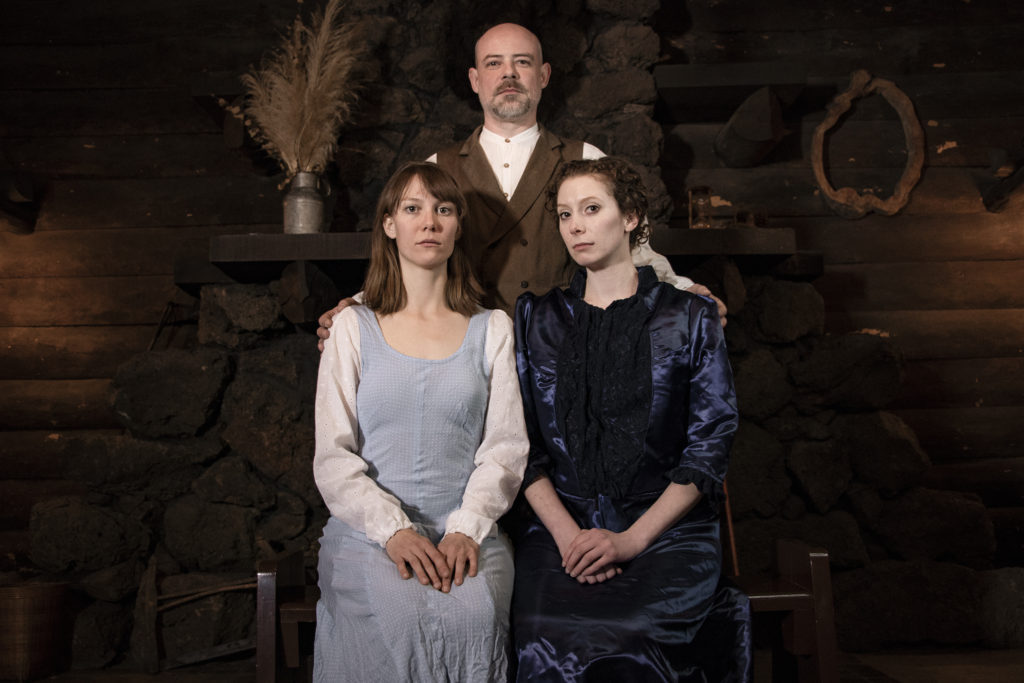







 What has been your favorite role with FlagShakes?
What has been your favorite role with FlagShakes? What’s your favorite quality of this character? Least favorite?
What’s your favorite quality of this character? Least favorite?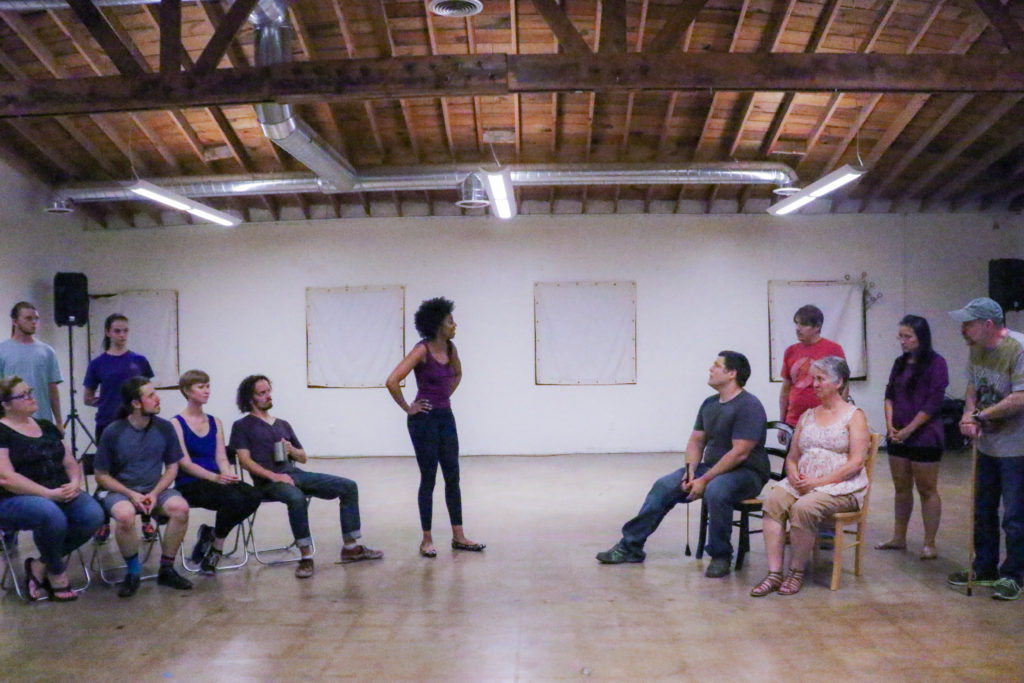

 As the text and speech coach for Flagstaff Shakespeare’s production of The Taming of the Shrew, that’s the nut I’m trying to crack. And such a delicious, impossible nut! Our director, Jesse Kamps, and fearless leader Dawn Tucker have entrusted me with the task of helping my fellow actors bring to vibrant life the “mere words” of a man 400 years dead. My task is twofold. The first part is to make sure the actors understand the text. What do the words mean? What is the sense of a phrase, a line, a speech? What is happening in the scene? Does this word or phrase mean the same thing now as it did when Shakespeare wrote it? The second part is to make sure the audience understands the same text, but this time as speech. The difference between text and speech, though it may appear largely mechanical (anyone who can read could do it, right?), is fraught with challenges. And the difference between merely well-spoken text and living, breathed-and-breathing Shakespearean language that is both comprehensible and bursting with meaning—well, that’s another matter entirely.
As the text and speech coach for Flagstaff Shakespeare’s production of The Taming of the Shrew, that’s the nut I’m trying to crack. And such a delicious, impossible nut! Our director, Jesse Kamps, and fearless leader Dawn Tucker have entrusted me with the task of helping my fellow actors bring to vibrant life the “mere words” of a man 400 years dead. My task is twofold. The first part is to make sure the actors understand the text. What do the words mean? What is the sense of a phrase, a line, a speech? What is happening in the scene? Does this word or phrase mean the same thing now as it did when Shakespeare wrote it? The second part is to make sure the audience understands the same text, but this time as speech. The difference between text and speech, though it may appear largely mechanical (anyone who can read could do it, right?), is fraught with challenges. And the difference between merely well-spoken text and living, breathed-and-breathing Shakespearean language that is both comprehensible and bursting with meaning—well, that’s another matter entirely.
 Enjoy the show!
Enjoy the show!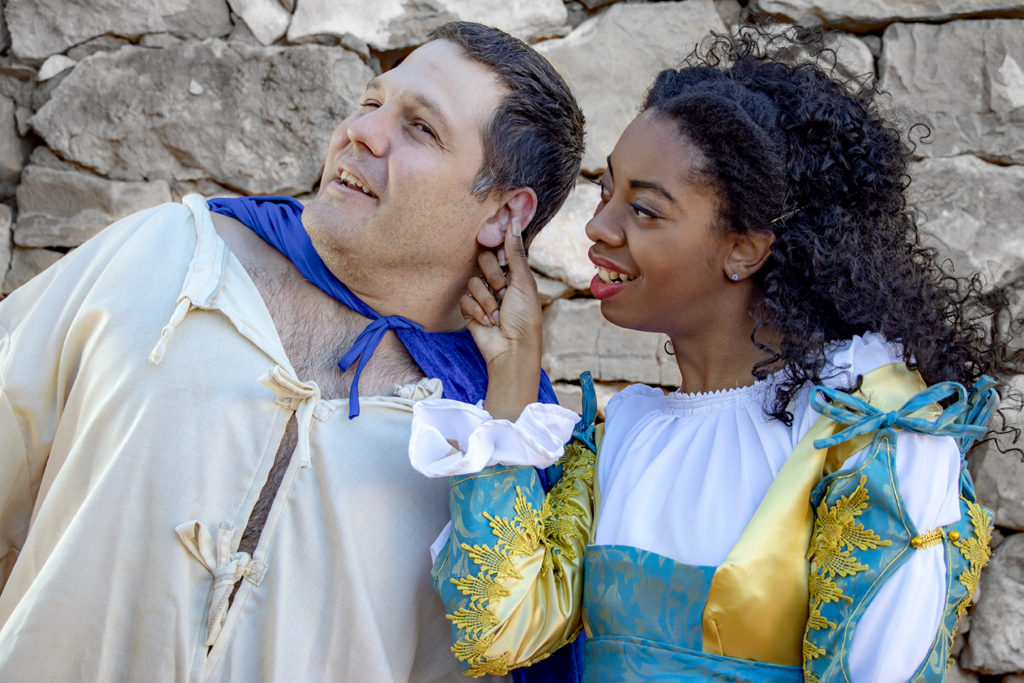
 What has been your favorite role with FlagShakes?
What has been your favorite role with FlagShakes? 
